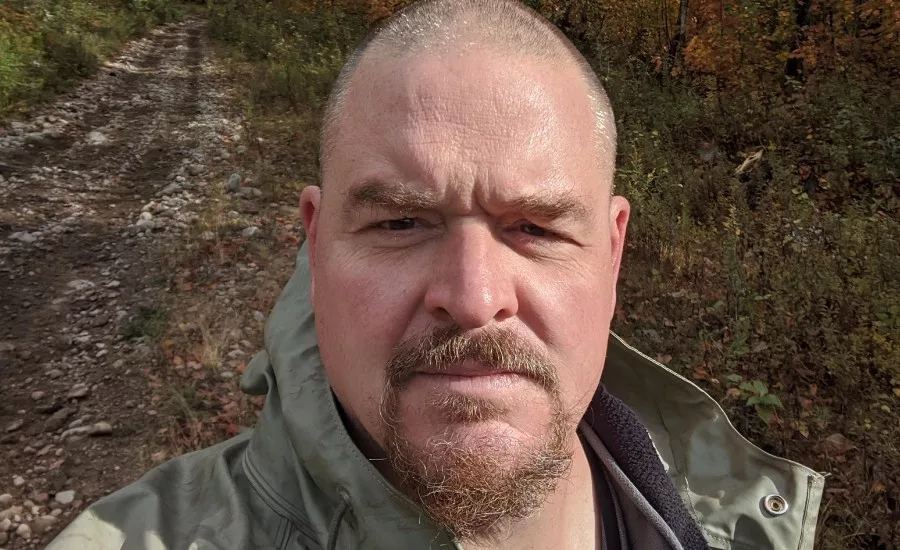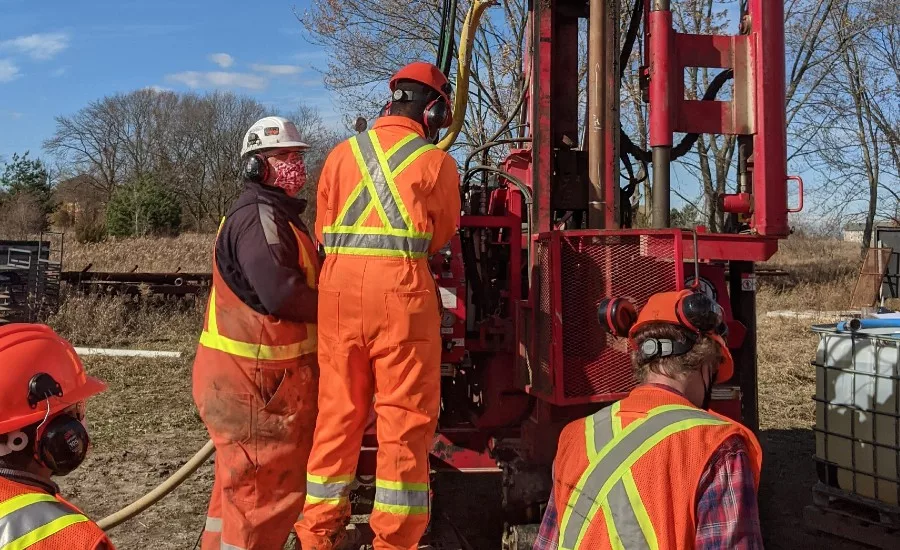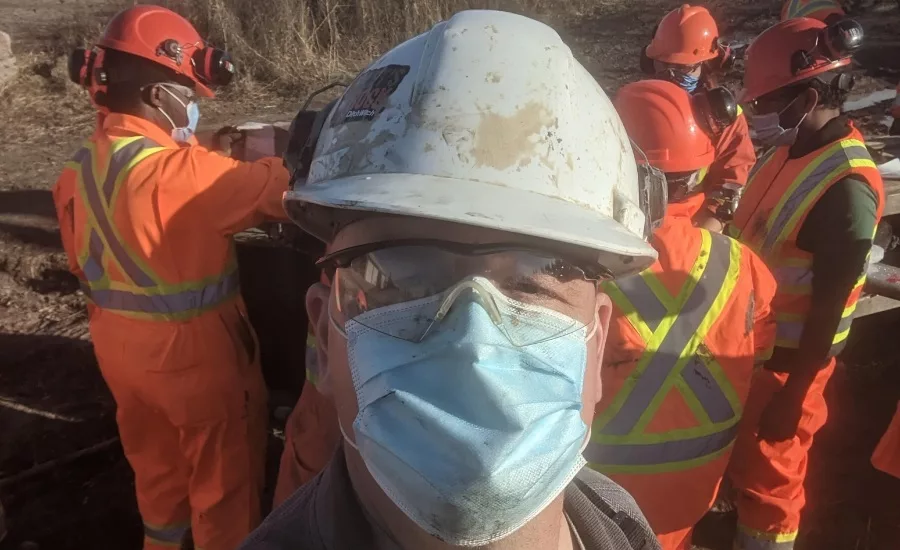Schooling the Next Generation of Drillers
Fleming College's Jim Smith Talks Driller Education, Responding to Industry

Fleming College Professor Jim Smith spend years as a driller before becoming an educator at the school. The campus he works from sits about a 90-minute drive northwest from Toronto.
Source: Jim Smith

“My boots are dirty still,” Smith says. A Fleming graduate himself, he still spends summers on a rig.
Source: Jim Smith

“We take our lead from the industry,” Smith says. The college offers hands-on learning in exploration, HDD, foundations and other types of drilling.
Source: Jim Smith
Drilling, like many trades, has seen its pipeline of fresh talent slow to a trickle as high schools put heavier emphasis on white-collar career paths. Jim Smith and other professors at Fleming College have done their share of work to open up that spigot.
Smith has taught at the Lindsay, Ontario, college’s Resources Drilling Technician Program for more than 15 years. He trains up-and-coming drillers and takes pride in the crop of candidates the school produces — for work around the world, not just in Canada.
“To be blunt about it, we have a lot of employers looking for our students. … At our job fair for the whole school, at least a third if not half of all companies are drilling companies looking for our 50, 60, 70, 80 students.”
Smith and other professors get those students ready for the industry with hands-on learning in exploration, HDD, foundations and other types of drilling. We spoke with Smith for a recent episode of our Drilling In-Site video and podcast series. (Click here to see the full video, or here to listen to the podcast.) Our talk here is edited for space and clarity.
Q. If I'm a young person, why should I come to Fleming College versus other trade schools that I might be might be interested in. What does Fleming have that distinguishes it?
A. Well, I think one thing that really makes a shine is the jobs. … It's nothing for our students that are graduating — especially, you know, really good students — with three and four job offers, and good jobs. We're not talking just mediocre pay. We got some good union work downtown (in Toronto) working foundation construction drilling, to exploration drilling.
And, two, why choose Fleming’s program? Well, we have state-of-the-art equipment. We stay current with that. There's been a great influx from the college in the last 5 years of equipment. We just got a brand-new diamond exploration drill a few, three years ago. We got our brand new Casagrande C6XP2, a Mobile B37, two Tamrocks, a Geoprobe. We have the equipment and the hands-on learning. … Getting out in applying that learning, I think, is key.
And I think credibility in the industry. For over 40 years, we've been putting out students here at Fleming. It’s really neat to see. … We’ll get call after call saying, “Hey, do you have any people that are looking for work?” A lot of those people [tell us]: I was a grad. I was a grad in ’92. I was a grad, you know in ’87. I was a grad in, you know, 2004. It's cool those people that are now back hiring were students that I might have went to school with, maybe one of our other instructors or professors went to school with, or I personally taught them.
Q. You spent more than a decade as a driller. How did you decide to become a teacher?
A. Well that kind of fell into my lap. I'd always maintain good relationship with the professors here at the college. I was a student here right out of high school and excelled — just loved it — and really had great relationships with Gord Bailey and a few of my other instructors. I would be drilling in the area and they would stop in and see me regularly, so they come out to the drill and see how I'm doing. A couple times, I came in to the college as they were teaching and spent a few minutes talking to the students. From that point forward, I think they thought: “This person can speak, and can speak eloquently. He knows the business because he's doing it every day.”
Initially I started teaching adults. So, I am young in the industry, and I am thrown in with 40 year veterans teaching CEC courses. For a lot of those technicians to get licensed in Ontario after Regulation 903 came in, there was an educational component that was never there before. So now we have veteran drillers, in some cases helpers, getting licensed or new license classes. They are going to classrooms that they haven't seen in 30 years. So I really cut my teeth, I think, teaching in one of the most difficult environments. As you can you can imagine, high school is one thing, where students don't know anything. But, now you're facilitating the learning of adults. For some strange reason, I thrived at it. I was able to pick their brains, but yet teach them something.
Q. Do industry trends affect what Fleming teaches? For example, recently demand for HDD for fiber internet has been high. How does a college like Fleming respond?
We take our lead from the industry — from those industry reps that we have on this board, as well as us as faculty. We are constantly getting together and saying, “Hey, let's improve.”
A. Well one thing we do is, every year we have an advisory panel. We have an advisory board that meets every year, and they're all from the industry. … We had a dewatering representative. We got exploration. We got construction. We got water well. The Ontario Ground Water Association sends a rep. We have this meeting to discuss that exact topic. What do they want to see trending and what can we work into our programs, and where we can work it in? It may not be instantaneously, but we as faculty kind of drive this and then our greater college higher-ups discuss budgets and how we can make it work.
We take our lead from the industry — from those industry reps that we have on this board, as well as us as faculty. We are constantly getting together and saying, “Hey, let's improve.” This morning, we had an hour and a half conversation on how to do synchronous learning — How can we utilize these cameras to do a circle check on a drill? — and, right now, we got a crew in the shop videotaping circle check on a Geoprobe 7822. So we are constantly wanting to improve, the industry guides these improvements and then it’s just us being involved in things like this or the National Ground Water Association, or I am on a forum next week for damage prevention for underground utilities, locators and so forth. So, you know, just keeping an ear to the industry and then saying, “How can we make it work and can we get the equipment? Can we get the budget? And are we able? Do we need to take some professional development to get up on that?”
The Full Interview
We interviewed Jim Smith of Fleming College for episode 21 of our Drilling In-Site series. In addition to these questions, our conversation also covered Fleming’s future, pairing the equipment with the curriculum, and other topics. See the full conversation at www.thedriller.com/insite, or listen to the podcast version at www.thedriller.com/insite-podcast. Episodes also in Apple’s Podcast store. Search Drilling In-Site and tap Subscribe.
Working on an interesting project or have industry wisdom to share? Email verduscoj@bnpmedia.com to be considered for a guest spot on Drilling In-Site.
Looking for a reprint of this article?
From high-res PDFs to custom plaques, order your copy today!


